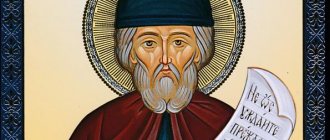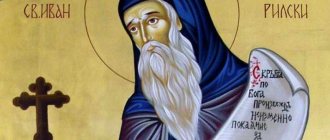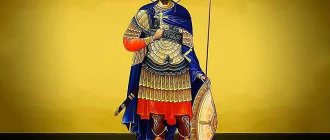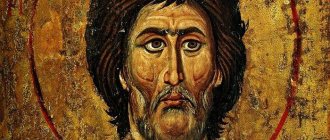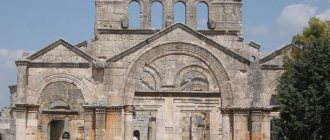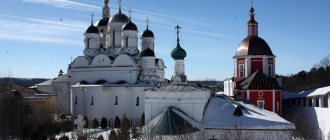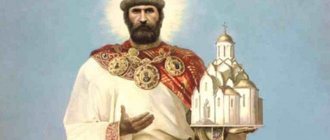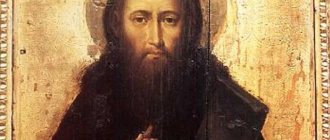Life of Saint Abraham
The life story of this saint begins with a mention of his origin. He came from a family of noble merchants and lived on the territory of Volga Bulgaria. Unlike most noble people, he led a completely unusual lifestyle. The merchant was known as a merciful, compassionate person who provided any help. After I began visiting Russian cities and communicating with Russian merchants on duty, I began to think about the Christian faith.
It is believed that it was then that the Lord decided to touch him and bless him to accept Christianity. Following his own heart, the merchant accepted Christianity and chose the name Abraham at baptism.
After this, the merchant began to preach Christian teaching among his fellow countrymen. The Bulgarians were truly amazed when they heard preaching speeches from a fellow believer who was with them. Many of them at first tried to persuade Abraham to return back, but then they realized that he stood his ground and began to threaten him with deprivation.
Abraham replied that he was ready to lose all his acquired property in the name of faith in Christ. After this, the saint began to be punished corporally. But after severe beatings, no traces remained on the body of the former merchant - the Lord took care of this, who was grateful to the martyr for his faith.
The Bulgarians continued to force the martyr to renounce Christ. When the patience of the tormentors ended, they took Abraham outside the city. Where they sequentially cut off first the arms, then the legs, then the head. So, in the spring of 1229, Abraham died with the name of God on his lips. The Lord was angry and punished the inhabitants of the city with a terrible fire, which burned out all living things.
At the tomb of the saint, signs began. A year after his death, the Volga Bulgars came to Georgy Vsevolodovich. They asked for a truce in a war that had lasted for 6 years. The prince agreed. One of his conditions was the transfer of the relics of Abraham to Vladimir.
How to ask for the gift of health?
You need to pray for healing by believing in your own words. It is not holy relics that work miracles, nor spoken words, but a person’s faith in the power of the Lord.
“Abraham, holy martyr of the Lord! I pray you to save my child (name) from sorrows and pains. I pray to grant you health and joy, with which the children are filled. Do not leave, saint, in the hour of calamity, of dashing trials. Help me overcome the unbearable burden, overcome the evil illness. Intercede for us before the Lord, beg to send us health. Amen".
History of the discovery of the relics
The relics were first discovered at the request of Prince George of Vsevolozhsk. They were taken to Vladimir after the conclusion of a truce with the Volga Bulgars. The second acquisition took place in the summer of 1711. Then the raku was placed in a specially designated place.
Later, the relics were hidden and then returned to storage. Finally, in 1950, when the Vladimir Church was closed, the relics were decommissioned and transferred to the museum for storage. It is unknown where the relics are today.
Abraham Sunday
The Holy Great Martyr was very revered in Vladimir. On May 11, 1711, the relics of Abraham of Bulgaria were transferred from the Annunciation chapel of the Assumption Church to the main Assumption chapel and transferred to a new wooden shrine. Since then, residents of Vladimir began to call this Sunday Avraamiev. On this day, a huge number of people flocked to the Dormition Princess Monastery to worship the holy martyr, and in 1785, in memory of the second transfer of the relics, a religious procession was established from the city's Assumption Cathedral to the Princess Monastery.
In a special closet were kept iron chains, which, according to legend, belonged to Abraham of Bulgaria.
In 1806, a new silver shrine was made for the relics. Its construction was entrusted to the silversmith - Pereslavl merchant Ponizovnikov for 2408 rubles. 44 ½ kop. Three sides of it were supposed to be made of pure silver, minted according to the design of the work, and the fourth side was copper. On the front side of the shrine there are three silver hallmarks, on which the sufferings of St. are depicted in black. Martyr Abraham, and in two marks, on the sides, the death and transfer of the relics to the city of Vladimir are described. On the cover of the shrine on the outside there is a picturesque image of St. Martyr Abraham, and with the interior upholstered in crimson velvet, the words are embroidered in gold: “St. Martyr Abraham, pray to God for us.”
Cancer St. Martyr Abraham of Bulgaria, 1898 - 1901. Photo: lubovbezusl.ru
On September 25, 1916, the relics of the holy martyr were transferred to the warm Kazan Church, into a beautifully decorated shrine with a granite canopy, which has been preserved to this day.
Icon of Abraham of Bulgaria
On canvases, icon painters most often depict the saint in full height.
He is dressed in simple clothes, which indicates his ordinary origin. A halo shines above the head - a symbol of belonging to the category of saints. And in his hands he has a scroll, which symbolizes preaching activities, the dissemination of the teachings of Christ among his fellow countrymen.
The meaning of the icon of Abraham of Bulgaria
The martyr is revered as a preacher and disseminator of the teachings of Christ. The significance of his activities is great. The saint not only accepted the Christian faith, he tried to make sure that true Muslims knew about it.
Martyr Avramiy (Abrahamiy) of Bulgaria, Vladimir
Brief life of the martyr Abramiya (Abrahamia) of Bulgaria, Vladimir wonderworker
The martyr Abraham was born in Kama Bulgaria (the Bulgarians lived between the Volga and Kama rivers, and subsequently gradually lost their nationality and mixed with the Tatars who defeated them) and was raised in the Mohammedan faith, which his compatriots professed.
He was a man of great means and was engaged in trade, was partial to the vain goods of this world and sensual pleasures, and showed hospitality to strangers and the poor. By the grace of God, Abraham became convinced of the falsity of the Mohammedan faith and the truth of the Christian faith and became a true Christian. Confessing the faith of Christ, he remained unshakable in the rules of the Savior’s teaching and for this he suffered from his fellow countrymen. When he came to trade in their so-called great city of the Bulgarians, he was persuaded and then forced to renounce Christ. Blessed Abraham responded to these threats with refusal. Then the Bulgarians, enraged, imprisoned him for many days, and then, seeing his inflexibility in faith, first cut off his hands, then his legs and head. Saint Abraham died as a martyr on April 1, 1229. The Christians who were at the fair, probably Murom merchants, reverently buried the body of the passion-bearer in the Christian cemetery in Bolgari. Noticing the miraculous healings of sick Christians taking place over his tomb, they reported everything to the blessed Grand Duke Georgy Vsevolodovich and a year later they took the body of the martyr to Vladimir, where Grand Duke Georgy Vsevolodovich, his wife, children, Bishop Mitrofan of Vladimir, the clergy, and the people met the relics of Abraham and they were transferred to a monastery called the Princess Monastery, and there they were laid on March 6, 1230 in the Church of the Assumption of the Blessed Virgin Mary. After the death of Abraham, the city of Bolgars almost completely burned out. Russian chroniclers say that the Lord sent these fires as punishment for the innocent blood of Abraham.
Complete life of the martyr Abramiya (Abrahamia) of Bulgaria, Vladimir wonderworker
This rich and noble merchant lived in Volga Bulgaria at the end of the 12th – beginning of the 13th centuries. The life of this man was very different from the life of many of his fellow countrymen and tribesmen. He was an unusually compassionate person, merciful to the needy, and spent his wealth on the needs of the suffering. Visiting Russian cities and communicating with Russian merchants, he became deeply interested in the Christian faith. According to God's vision, grace touched his heart and, having learned the truth of the holy faith of Christ, he accepted Holy Baptism. So this merchant becomes a Christian and receives a new name, with which he is written on the pages of the Book of Life - Abraham (nowhere in the chronicles is the name of the saint mentioned before Baptism). After Baptism, the saint, with the word of the Gospel, and most importantly, with the Christian way of life, carries the apostolic sermon among his people. And just as before the adoption of Christianity Abraham had compassion for the misfortunes and deprivations of his neighbors, so after accepting the saving faith of Christ he began to be sick in spirit and grieve over the spiritual misfortunes of his fellow citizens, about their ignorance of the true God of heaven and earth, who was revealed to us through His Only Begotten Son in the Holy Spirit, and about the disorder and disorder of morals that comes from this ignorance (John 17:3; Rom.25:31). Inspired by holy zeal for the holy faith and brotherly love for his wicked fellow tribesmen, Abraham, being on trade business in the capital of Volga Bulgaria - the Great Bulgars, during the fair (aga-bazaar), instead of engaging in trade and acquiring temporary, earthly goods, begins to preach to his fellow tribesmen about eternal, incorruptible blessings, and offers them a sermon about Christ the God-man, “who was crucified for us with his will, who rose from the dead and ascended with glory in the flesh into heaven,” about His beginningless Father and about the co-eternal Father and Son, the All-Holy Spirit.
The Bulgarians were amazed when they heard a Christian sermon from their fellow tribesman and former co-religionist. His compatriots not only did not express sympathy for the preaching of the holy man, but even became irritated with the preacher, especially when they saw his inflexibility after repeated admonitions and advice to leave the Christian faith. They initially began to persuade Abraham, as someone beloved by everyone, to leave the faith of Christ. When gentle persuasion did not have an effect on the confessor of Christ's name, they began to threaten him with taking away his property. To these threats the blessed one replied that for Christ the Savior he was ready to lose not only his property, but would not spare his very life. After that the beatings began. They beat Abraham “with the whole world,” they beat him so cruelly that not a single undamaged place was left on the martyr’s body: “as if there was no place on him, she was intact and unhurt” (from the akathist to the martyr). They tried to silence him, to renounce Christ, but it was in vain. Then the Bulgarians, furious as animals with the confessor, tormented him in prison for many days, forcing him with many torments to renounce the Christian faith. The valiant sufferer for the true faith did not faint in torment, but, strengthened by the grace of God, he was even more confirmed in holy love for the Redeemer of the world. Then, seeing his inflexibility in faith, the evil fanatics took him out of the city and at a well not far from the bank of the Volga they first cut off his hands, then his legs and head. So on April 1, 1229, with a confession of true faith on his lips, this merciful and sincere man of God went to his Heavenly Father. The Murom merchants, who witnessed this, buried the martyr in a special cemetery, “where all Christians were buried.” The Lord soon punished the inhabitants of the Great Bulgars for the blood of His saint with a terrible fire: “... soon this great city with many and countless wealth burned out!”
Signs very soon began to appear at the tomb, giving rise to the veneration of the saint, rumors of which spread throughout Orthodox Rus'. In 1230, ambassadors from the Volga Bulgars came to the noble Prince of Vladimir Georgy Vsevolodovich to ask for peace (after a six-year war with Russia).
Prince George agreed to their desire and, as soon as peace was concluded, he sent an embassy to the Bulgars to transfer the relics of the martyr of Christ. On March 9, 1230, his relics were transferred to Vladimir, to the Princess Monastery (where the surviving particle is still kept).
Shortly before the revolution in the village. The Bulgarians were given an ancient image of the saint with a piece of his relics and an old wooden shrine. These shrines were lost during the godless hard times. Only the phalanx of the finger of the right hand has been preserved, which in godless times was preserved with reverence by the inhabitants of the city in their homes, and is now located in the St. Abraham's Church in the city of Bolgar. The Lord glorified His saint with many miracles that occurred through his prayers at the holy relics. It was noted that the martyr had a special grace-filled power to intercede before God for sick children; records of the healing of the sick have been preserved. Abraham of Bulgaria is prayed for patronage and success in trade and personal entrepreneurship.
